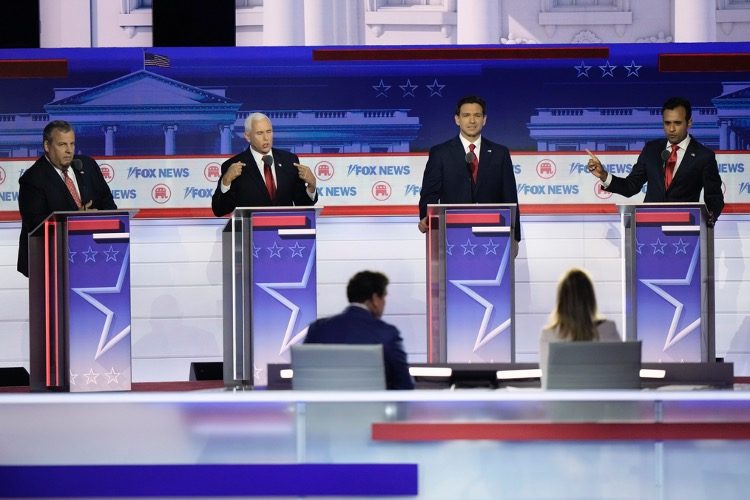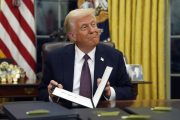
The pundits will no doubt declare a “winner” of the Republican presidential candidates’ debate held Wednesday night in Milwaukee, Wisconsin, but those who would like to see a constitutionalist, pro-limited-government candidate leading the Republican ticket are likely to be disappointed.
Entering the debate hosted by Fox News, Governor Ron DeSantis was the front-runner of everyone other that, in the words of moderator Brett Baier, the “elephant not in the room,” Donald Trump. Former President Donald Trump skipped the first Republican debate and chose instead to have a sit-down interview with former FOX News star Tucker Carlson. Perhaps DeSantis’ finest moment was when he refused the silly tactic of presidential debate moderators of demanding the candidates to “raise your hand” if you agree with a certain political position.
In this case, Martha McCallum asked the eight candidates to raise a hand if they agreed that the climate is changing and that humans are causing it. Before anyone could raise their hand, DeSantis roundly blasted the tactic, as well as the question. He insisted that if she wanted to ask a question, ask it, but to not to command the participants to compliantly raise their hands.
Running behind DeSantis in the polls, but ahead of the others on the stage, was businessman Vivek Ramaswamy. He had his own good moment, telling McCallum that “climate change is a hoax,” and that the “anti-carbon agenda is a wet blanket for our economy.”
Governor Doug Burgum of North Dakota, perhaps the least-known of all the other candidates in the debate, demonstrated that he perhaps had the best understanding of the Constitution. Noting that he is a pro-life governor of a pro-life state, he explained that he would not sign a national bill banning abortion, because the 10th Amendment leaves such questions to the states. “The states created the federal government, not the other way around,” Burgum said.
Former South Carolina Governor Nikki Haley cited political reasons that she would not sign a ban on abortions after six weeks of pregnancy. “A president cannot ban abortion,” Haley explained, but she did not cite the 10th Amendment, nor any other part of the Constitution that she, as president, would be sworn to follow. Instead, she said that Republicans would need 60 votes in the Senate to break any Democratic Party filibuster against such a ban.
Senator Tim Scott of South Carolina did not cite any part of the Constitution, either, giving him or Congress the legal authority to a ban. Instead, Scott said that we “cannot let states like California have abortion on demand up to birth.”
Former Arkansas Governor Asa Hutchinson asserted that the Congress could pass a national ban on abortion because the Supreme Court gave the issue “back to the states.” Of course, this a similar fallacy. Neither the president nor the Congress possess constitutional authority to either ban abortion, legalize abortion up to birth, or something in-between. It is a state function. But Hutchinson’s statement is particularly offensive to constitutionalists. In response to the assertion that there is no constitutional authority for Congress to make a federal law on abortion, Hutchinson essentially said that the Supreme Court is the Constitution, not that the Constitution is the Constitution.
Interestingly, former Vice President Mike Pence claimed his action of refusing to award electoral votes to Trump instead of Biden was simply him following the Constitution. But he also brushed aside any “constitutional” arguments on abortion, pledging that he will “push for a 15-week ban” against abortion.
Crime was another issue that seemed to confuse most of the candidates on the stage, with all of those who spoke assuming that the president of the United States can perform as the national “cop on the beat.” Pence had a “strong commitment” to law enforcement. Former New Jersey Governor Chris Christie, a former federal prosecutor himself, announced that he would have federal prosecutors “take over” prosecutions in state and local jurisdictions. Despite his assertion that he is a devotee of the Constitution, Ramaswamy said he would put “more cops in the streets,” but he did not cite the specific provision of the Constitution giving him such power.
But Ramaswamy was the only candidate who opposed the urge for America to become the world’s cop in regard to the war in Ukraine. Only Ramaswamy said he would not support more funding for Ukraine in its war with Russia, saying the others on the stage have their “pope in Kyiv,” an apparent reference to Ukrainian President Volodymyr Zelensky. DeSantis did say that the Europeans should pay more. Of course, in 2000, then-Texas Governor George W. Bush promised he would have a “more humble foreign policy,” but he certainly did not follow through with that promise as president, so these debate statements are not an iron-clad indication of how the candidates would actually perform in office.
Pence certainly took a strong interventionist position, arguing that America should continue to be “the leader of the free world.” Ramaswamy tried to counter by arguing that the same thinking that got us into no-win wars in Vietnam and Iraq was causing to slide into another no-win war in Ukraine, but Haley swung back that an American president needs “moral clarity,” asserting that a “pro-American country was invaded by a thug,” and that Ukraine was the “first line of defense for us.” DeSantis then interjected that his first obligation as president would be to our own country, and promised, “I am not going to send troops to Ukraine.”
All in all, most would find these candidates better than the incumbent president, Joe Biden, but that is certainly not a high hurdle.

